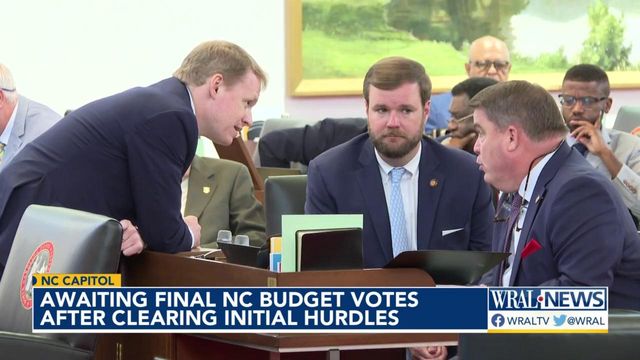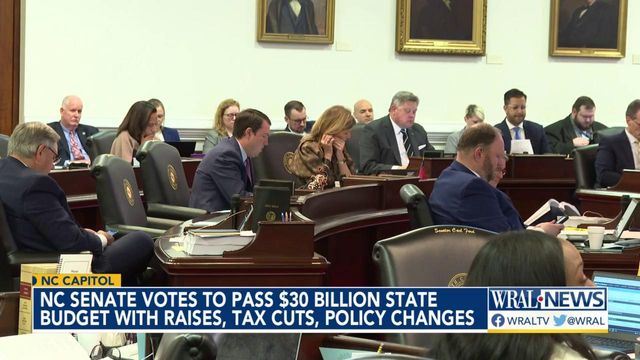In key first votes, NC lawmakers pass $30-billion state budget with raises, tax cuts, controversial policies
North Carolina's new, $30-billion budget passed initial votes at the legislature Thursday — the first in a series of approvals that are expected to soon wrap up months of negotiations on the budget, most of it done in secret.
Republican leaders defended the budget for balancing tax cuts with moderate raises for state employees, additional health care funding, millions added to savings, and billions spent on construction and infrastructure projects.
"This budget is built on key investments in our state's infrastructure — meeting our needs on health care, education, transportation, manufacturing and tourism, just to name a few," House budget writer Rep. Donny Lambeth, R-Forsyth, said during the floor debate Thursday.
Every Democrat in the state Senate voted against the budget, as did all but a small handful of Democrats in the House, despite the budget containing Medicaid expansion, a key priority of Democrats for years. They said the budget contained too many other objectionable features such as further tax cuts, too-low raises for state workers and hundreds of millions in additional funding for private schools in the form of tuition vouchers.
Lawmakers plan to finalize the budget Friday, including with a vote shortly after midnight, but Thursday's sessions likely contained the majority of the debate.
Democratic lawmakers spent hours objecting to the budget Thursday, attacking decisions such as the GOP-backed choice to spend hundreds of millions of dollars more on private school tuition vouchers rather than paying higher raises to teachers or state workers.
Most state workers would get a 4% raise this year and a 3% raise next year, if the budget becomes law — which is widely expected. Public school teachers would see a range of step increases on their salary ladder, from 3.6% over the next two years for teachers with over 15 years of experience, up to a nearly 11% increase for beginning teacher pay from $37,000 a year now to $41,000 by the 2024-25 school year.
Sen. Michael Lee, R-New Hanover, said that by the 2024-25 school year the average teacher should be making more than $60,000.
"This budget continues the successes North Carolina has seen over the last decade," said top Senate budget writer Sen. Brent Jackson, R-Sampson, who said he's proud that "We’ve been able to do so without saddling the taxpayers of this state with debt."
Democratic Gov. Roy Cooper told reporters Thursday he wasn't sure yet if he'd veto the budget after it passes the legislature. He likes that it expands Medicaid, he said, but is concerned that many parts of it are unconstitutional or simply misguided.
"[Medicaid expansion] would allow us to get health insurance to more than 600,000 North Carolinians to make sure that rural hospitals have a better chance to operate," Cooper told reporters at an event in Sanford. "That is a positive part of this budget. However, it is a bad budget in many ways. It grossly under-funds public education. It provides tax cuts for the very wealthiest among us. It provides private school vouchers, which will end up hurting public education."
Advocates for teachers and state employees have criticized the budget for not doing more on raises, given the state's record spending levels. Rep. Renee Price, D-Orange, said the budget disrespects current and retired state workers.
"We should be providing larger raises for our dedicated employees," she said. "We should be giving cost-of-living [pension increases] to the folks who spent years upon years of their lives serving us."
But Republican leaders have defended their choices on the budget, which includes a mix of raises, tax cuts, infrastructure improvements and money put aside for savings.
GOP priorities in budget
The budget continues a push by fiscal conservatives to pay off billions of dollars in debt, with this and past budgets cutting the state's debt from $6.5 billion in 2016 to $3.5 billion this year, said budget writer Rep. Dean Arp, R-Union. He added that the state also now has more than $5 billion in savings, in case it's needed in the future to respond to natural disasters or fill budget holes caused by economic downturns.
Arp added that between the last two budgets, the state government will have also spent $2 billion on building new schools around the state — something that's actually the duty of local governments, but which the state has decided to help out on to aid struggling communities, particularly in rural areas.
The budget also contains a number of conservative policy wins, notably a massive expansion of the Opportunity Scholarship Program that grants public money to families for private school tuition.
The budget would open up that program to wealthy families for the first time in almost a decade of existence — something school choice advocates have sought for years, but that critics fear will drain funding from the state's public schools. The state currently spends $133 million on the voucher program, and the new changes are expected to increase its spending to $500 million annually by the end of the decade.
"We could double the raises to our teachers if we spent the money that we're spending on private school vouchers and instead put it toward our teachers," Rep. Brandon Lofton, D-Mecklenburg, said Thursday. "This budget not only fails to meet our needs today, it makes it harder for us to meet our needs going forward."
There was intense partisan debate Thursday over the budget's priorities, both with spending and with the policy changes tucked into the budget that have nothing to do with spending. Rep. Julie von Haefen, D-Wake, said the legislature is mostly made of older people who have more or less ignored the growing issues with affordability and availability of childcare. She noted that an earlier version of the budget did have $10 million extra funding for early childhood education, but that it was cut somewhere along the way, during the GOP's secret budget negotiations of the last few months.
"We had more than enough opportunity to address all the various aspects of our childcare crisis this year," von Haefen said. "This budget fails our kids."
But there were also some areas of bipartisan agreement, particularly on health care. Medicaid expansion has long been a top priority for Democrats. And the budget also contains significant spending on improving mental health care statewide.
"Are there challenges still? Well, absolutely," Lambeth said. "But working together we can meet those challenges. This budget responds to the stress on our citizens by investing in our state."
Other provisions in the budget include:
- A shield from public records laws for legislators. State lawmakers have already exempted themselves from some parts of North Carolina's public records laws. The new budget allows lawmakers in the future to refuse any records requests they don't want to comply with.
- A ban on schools, colleges, state agencies and local governments from demanding employees get a COVID-19 vaccination, except for hospitals and other facilities that have to require it to qualify for federal funding.
- Sweeping new powers to a legislative committee to investigate government agencies and private companies that get state funding, and to force anyone involved in the investigation to keep it a secret. Democrats have compared the proposal to Nazi- and Soviet-era secret police squads, saying it'll be used by GOP leaders to carry out political retribution.
- Longer renewal periods for driver's licenses. Most people would only have to renew their driver's license every 16 years, instead of every eight years. The state DMV, however, says that would violate federal rules.
- An increase in the retirement age for judges on the state Supreme Court and Court of Appeals from 72 to 76, a change that would allow Republican Supreme Court Chief Justice Paul Newby, a Republican, to stay on the bench longer. Supreme Court justices are elected, and the change would help protect the court's 5-2 Republican majority. Another provision would eliminate nonpartisan members of the Judicial Standards Commission, which investigates ethics complaints against judges, and would replace them with political appointees chosen by legislative leadership.
- New authority for the legislature over the state’s community college system, including a new requirement that the system president be confirmed by the General Assembly. This is one of several power shifts the legislature’s Republican leadership has contemplated this session.
- A ban on the State Board of Elections joining a national program aimed at combating voter fraud, called ERIC, which has been targeted by national conservatives after the 2020 elections.
The final budget document was made public Wednesday afternoon, about 18 hours before the vote, causing Democrats to sharply criticize the process and lack of public input. The budget was negotiated in secret for months by top GOP leaders and is being passed using a procedural move that doesn't allow anyone to suggest changes or amendments now that it has become public.
The budget is expected to get support from at least a few Democrats, as well as wide support among Republicans, in final votes — something that wasn't certain even a few days ago, when a controversial plan to legalize casinos was also being floated by GOP leadership.
Following strong pushback from social conservatives, Senate leader Phil Berger and House Speaker Tim Moore announced Tuesday that the casino legalization push is dead, at least for this year's session.













